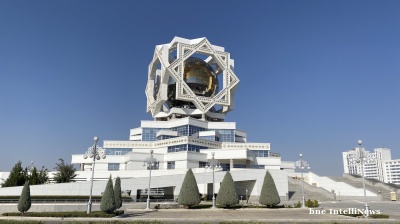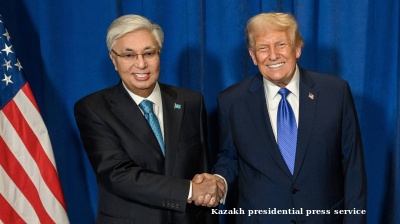Politics
Kosovo ended 2018 with its always fraught relations with Serbia at crisis point, following Pristina’s imposition of punitive import tariffs on its neighbours and the parliament’s December 2018 vote in favour of creating a Kosovan army.
Earlier in the year, the two countries had appeared close to finding a solution to their longstanding conflict, following years of EU-mediated talks, possibly involving a controversial land swap, though such a course faced fierce opposition both within the two countries and from influential international politicians such as German Chancellor Angela Merkel.
Instead of leading to an agreement, however, the talks were suspended in September, and relations deteriorated dramatically after Belgrade’s lobbying blocked Kosovo’s entry to Interpol. Pristina retaliated by slapping 100% import tariffs on goods from both Serbia and Bosnia & Herzegovina. Kosovan Prime Minister Ramush Haradinaj said that the measure will be cancelled only if Serbia recognises Kosovo as a separate country.
In the latest provocative move Kosovan Parliament voted on December 14 for the transformation of Kosovo Security Force (KSF) into a regular army, another move which infuriated Belgrade.
Serbian authorities claim the move is illegal and fear that this will put in danger lives of Serb minority in Kosovo and will lead to insecurity and new tensions in the whole region. For Serbia the only legal military presence in Kosovo is Nato-led KFOR mission.
Nato secretary general Jens Stoltenberg said that formation of Kosovo’s army is “ill-timed”, but the US fully supported the process.
Despite the escalation in tensions towards the end of the year, and dire warnings from Serbian officials, the rift is not expected to deepen into renewed conflict, given the importance both sides place on EU integration.
The dialogue is crucial for both Belgrade and Pristina, a factor that is expected to bring about a return to productive dialogue at some point in 2019. Kosovo is not yet an EU candidate country, but plans to join the European Union family while undertaking the needed reforms, but can only do so if it normalises relations with Serbia.
The European Parliament said in November it is important for Kosovo to stay on its path towards EU integration. The country was urged to resolve issues regarding its “under-financed judiciary, widespread corruption, elements of state capture and undue political influence and problems with due process, which all need to be addressed beyond the progress made on meeting visa liberalisation requirements.”
A related issue of great importance for Kosovan citizens is visa liberalisation. Even though the European Commission confirmed that Pristina met all conditions for visa-free travel and that should be granted as soon as possible, there is no concrete data set for the launch of the process. On the other hand EU Enlargement Commissioner Johannes Hahn said that it could happen in 2020.
Economics
Kosovo has one of the strongest GDP growth rates in the Western Balkans region alongside Albania and Serbia.
Kosovo’s GDP growth is expected to reach 4.2% in 2019 as a result of acceleration in public investment, following an estimated growth of 4% in 2018, the International Monetary Fund (IMF) projected. For 2019, the European Bank for Reconstruction and Development (EBRD) projected economic growth of 4% for Kosovo.
The Kosovan government based the 2019 budget even on higher GDP growth, of 4.7%, up by 0.4 pp from the estimation for 2018, which is expected to be driven by consumption.
Inflation is seen by the government at 1.3% in 2019 mainly due to increased prices of food, alcoholic beverages and tobacco as well as transport.
According to the IMF, Kosovan headline inflation is expected to average 1.4% in 2019, up from 0.9% in 2018.
The Fund said that maintaining macroeconomic stability, managing fiscal risks, and advancing structural reforms are critical to ensure stronger and more inclusive growth for Kosovo.
Kosovo has one of the highest jobless rates in Europe. While in 2017, the unemployment declined in all countries in the region, in Kosovo that was not the case. Kosovo has drafted a strategy to lower the jobless rate among the population.
Finance
The budget for 2019 foresees revenues of €2.37bn, significantly higher compared to previous years and a surplus of €5mn. The Kosovan government’s priorities in the 2019 state budget will be social protection, the rule of law, health, education and the environment protection.
Analysis of the budget from local think tank GAP Institute for Advanced Studies demonstrates a significant change in the way the budget will be financed in 2019. “Unlike 2017, when 95% of the budget was funded through revenues, in the 2019 draft-budget that category covers 82% of the expenditure,” it said in a report. “The weight of loans and once-off income from KPA has increased from 5% in 2017 to 18% in 2019. In absolute terms, the need for financing has grown from €82mn in (2017) to €416mn, an increase of €334mn or 407%.
Business
In 2019, Kosovo is expected to launch a major energy project, the construction of a 500MW Kosova e Re coal-fired power plant by US company ContourGlobal.
Even though the World Bank refused to finance the new Kosovan plant as it shifts its focus from coal to renewables, ContourGlobal said it is committed to the implementation of the project worth around €1.3bn.
This will be the largest energy project in Kosovo that will replace the outdated Kosova A thermal power plant, seen as one of the largest polluters in the country. The plant is expected to solve Kosovo’s problems with high pollution and electricity supplies as power outages due to outdated thermal power plants are very frequent.
Outside the energy sector, infrastructure works were launched in late 2018 at the Suva Reka industrial zone, which is being set up near Prizren with the aim of attracting investors and creating new jobs. The authorities hope to entice businesses in a wide range of sectors, from food processing to electronics.
In terms of regional cooperation, Kosovo plans to unify customs services and to scrap all trade barriers with neighbouring Albania, as well as to remove roaming tariffs with Albania in the first half of 2019.
Features

Washington has a new focus on a Caspian energy play
For most of the last three decades since winning independence, Central Asia has been a bit of a backwater. Not any more. The Trump administration is becoming more focused on Turkmenistan's vast gas reserves and can smell money and power there.

BOTAŞ and Turkey’s hub ambition: from “30-year dream” to cross-border reality
For Ankara, the symbolism is as important as the molecules: Turkey’s energy map is shifting from end-market to hub.

Indian bank deposits to grow steadily in FY26 amid liquidity boost
Deposit growth at Indian banks is projected to remain adequate in FY2025-26, supported by an improved liquidity environment and regulatory measures that are expected to sustain credit expansion of 11–12%





